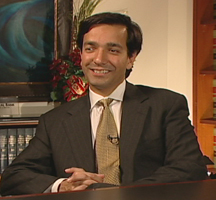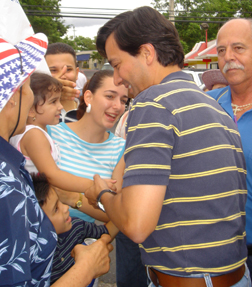|
 |
|
Para ver esta página en español, oprima aquí. PUERTO RICO HERALD First Modern Republican Resident Commissioner Ready to Represent Islanders’ Interests Puerto Rico Herald Interview with Resident Commissioner Luis Fortuño, new Resident Commissioner of Puerto Rico By THE PUERTO RICO HERALD
December 29, 2004 PART ONE OF TWO On December 22nd, from his law offices in San Juan, Resident Commissioner- Elect Luis Fortuño spoke to the Herald about his plans upon assuming his new post in Washington as a member of the U.S. House of Representatives. At the time of the interview, the recount of votes from the November 2nd election in Puerto Rico had not been completed, although it appeared likely that Mr. Fortuño would prevail, but not his running mate for the office of Governor, Pedro Rosselló. Subsequently, the Fortuño victory has been certified by the Puerto Rico Elections Commission (CEE) and he is to be sworn in as a member of the 109th Congress on January 4, 2005. Mr. Fortuño began the interview by giving the Herald an overview of the academic and professional career that had brought him to this point of political success, his first victory in elective politics. Although he had been former Governor Rosselló’s Director of Tourism and Secretary of Economic Development and Commerce for four years, he had been new to the rough and tumble of Puerto Rican campaigning in the role of a candidate. For 16 of the past 20 years, Mr. Fortuño has been practicing law in Puerto Rico. He is a graduate of Georgetown University in Washington and the University of Virginia Law School in Charlottesville. He told the Herald that it was at Georgetown in 1980 that he got his first taste of politics, then plunging into Ronald Reagan’s initial presidential campaign, there tasked with such mundane duties as "preparing documents that would go out of a mailroom and stuff like that." Apparently it was a seminal experience, since, judging by his answers to our questions, the Reagan influence has shaped his political persona and policy preferences ever since. Upon his return to Puerto Rico, he became active in the New Progressive Party (NPP) and the local chapter of the national Republican Party (GOP), at one point becoming a GOP National Committeeman. As a rising star in both parties, he found himself going back and forth to Washington frequently, there interacting with legislators, especially Republicans, shaping law affecting Puerto Rico. During the last Presidential race, he worked to attract Hispanic and resident Puerto Rican voters to the successful cause of President George W. Bush’s reelection campaign in Florida and elsewhere. Based on this experience, in 2003 Luis Fortuño decided to enter the crowded NPP primary campaign for Resident Commissioner.
Can you describe your first campaign for political office just completed, beginning with the primary battle for the right to represent the NPP as a candidate on the ballot for Resident Commissioner? Give us a feel for what your approach was, and what your campaign platform offered to voters. RESIDENT COMMISSIONER FORTUNO: It was a very tough primary race. We had a former governor, Carlos Romero Barceló, State Senator Miriam Ramirez and a former President of the Puerto Rico Senate, Charlie Rodriguez. And they all have a lot of experience. They all had run for office several times. And this was my first race. I decided that I had to be certainly different in that sense. And what I did is that I would stick to my values. I would talk about faith-based initiatives. I would talk about the need to work together, in terms of with the private sector, closer together with the private sector. I would talk about the need to get our economy moving at a faster pace than the national economy. And somehow it resonated well with the electorate and I ended up getting 62% of the vote in that primary race. And we had over 630,000 voters participating in that primary race. And it was an eye-opener for me. My campaign was positive. I never got into the negative side of the campaign and my campaign stayed above the fray all along, and I did the same in the general election and I believe that it paid off. HERALD: What sort of concerns did the voters express? What sorts of questions did they ask you? What are their expectations of you? RESIDENT COMMISSIONER FORTUNO: Well one major issue was whether we needed a Republican or a Democrat in Washington, and that was a big issue. And it became a bigger issue, a larger issue, when in the general election my main opponent (Roberto Pratts) became chairman of the Democratic Party in Puerto Rico. And I'm the national committeeman for the Republican Party in Puerto Rico. And that became an issue. So, that question was coming up, popping up all the time as to why do we need a Republican in Washington. And not only do I believe I represent…I'm closer…I'm better…or much better attuned to the real values of our electorate, but I believe it's the right time to send a Republican to Washington. And I'm glad that the election results at the National level prove me right in the sense that not only did we get the president re-elected, but we have a clear majority now in the House and the Senate. And that will assist me and provide me with a tool that otherwise we wouldn't have to move our issues forward. That became a campaign issue. Everyone should know that. That was one of the main issues. And the people chose a Republican over a Democrat. HERALD: Many candidates of the New Progressive Party have been handily elected and will be the majority in both the chambers of the legislature here and the mayoral races turned out well for you. However, there's to be a split government here in Puerto Rico with some very divergent views. How's that going to affect your approach to your job? RESIDENT COMMISSIONER FORTUNO: Well, I certainly would rather have a member of my party as the Governor. But the electorate makes the decision. The way I see it, is that I have a job to do regardless of who's the Governor. That I have to serve the people and that I have a clientele. On the one hand, certainly it's the state government. But I have the 78 mayors, the presidents of the private and public universities, the heads of the NGO's, all of the community-based and faith-based organizations, and so on and so forth. So I have a diverse clientele, shall we say and I will be working with all of them. In terms of my relationship with the Governor, I'm hoping that it will be a constructive one, but that will be up to him. I feel very comfortable by sitting in the majority in the House in Washington. And I will do what I have to do to deliver results to the electorate that elected me. HERALD: You will caucus with the Republicans will you not? RESIDENT COMMISSIONER FORTUNO: Yes, indeed. HERALD: And what will be your agenda, your legislative agenda? Of course being one of some four-hundred-and-something individuals, it may be a presumptive question to ask, but certainly you must have some ideas about where you want to go right off the bat. So, what is your legislative agenda? RESIDENT COMMISSIONER FORTUNO: Well, I understand that there will be a number of pieces of legislation that will move forward, regardless. Like Social Security and the reform that we need, and maybe some legislation to deal with Medicare issues stemming from major Medicare reform of last year. I am convinced that there will be some cost-cutting measures because of the national deficit. However, having said that, in terms of Puerto Rico, I see on the one hand that there's a need to take advantage of certain pieces of legislation that will be creating jobs throughout the nation, and Puerto Rico should not be left out. One of those pieces of legislation is enterprise zone legislation, or as the president has called it, opportunity zone legislation. And I will be working to make sure that Puerto Rico is included in that legislation. Secondly, just last October Congress approved some major tax legislation that provides incentives to maintain manufacturing operations in the United States. Puerto Rico was left out. And I'm hoping there will be some technical legislation that will allow us to make sure that Puerto Rico's territory, U.S. territory, will be included in that legislation, so that we're not at a disadvantage, vis-à-vis the 50 states, for manufacturing purposes. Thirdly, there is legislation regarding Medicare I'm looking forward to see approved, in terms of the formula that is used to reimburse hospitals in Puerto Rico. We are not on par with the hospitals in the 50 states, and we need to make sure that that happens. So, I'll be looking forward to be sure that that happens. There is legislation regarding the use of the former Roosevelt Roads military base. And I intend to make sure that it is adequate legislation, in terms of creating job opportunities in Puerto Rico and at the same time protecting some very sensitive areas that have flourished within what used to be Roosevelt Roads. And, then there is status. And I believe that the time is ripe to continue to move forward on that issue. President Bush, just a year ago, named the individuals that compose the White House Task Force on Puerto Rico. And in 2005 they'll be providing the President and Congress with specific recommendations on how to move this issue forward. It just happens that both national parties, the Democratic and the Republican parties in their platform, 2004 platforms, call for movement on this issue, with non-territorial options. So I believe there will be some movement in this area as a result of this; but especially as a result of the report to be provided by the White House Task Force, sometime in 2005. END OF PART 1 In next week’s Herald, the 2nd part of Mr. Fortuño’s interview will be published. In it he speaks of the process by which he thinks a permanent political status for Puerto Rico can be achieved and he comments on the Puerto Rico Federal Affairs Administration (PRFAA) and what he believes its appropriate role should be in representing the island on the U.S. mainland.
|

 HERALD:
HERALD: